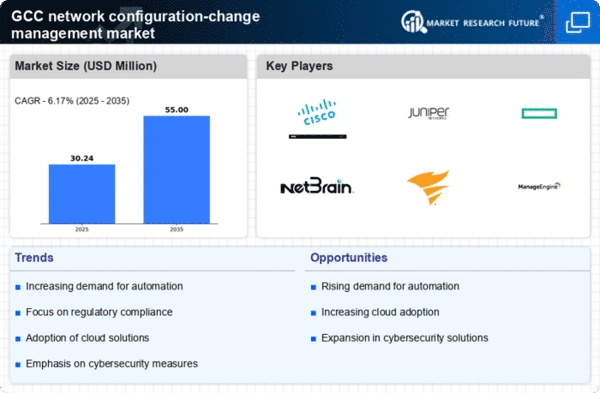Expansion of Cloud-Based Solutions
The expansion of cloud-based solutions is a significant driver in the network configuration-change-management market. As organizations in the GCC migrate to cloud environments, the need for effective configuration management becomes paramount. Cloud-based solutions offer scalability, flexibility, and cost-effectiveness, which are appealing to businesses looking to optimize their network operations. Recent data suggests that the adoption of cloud services in the GCC has increased by 40% over the last two years, further fueling the demand for cloud-compatible configuration management tools. This shift is prompting vendors to innovate and develop solutions that seamlessly integrate with cloud infrastructures. The potential for enhanced collaboration and remote management capabilities is likely to drive further growth in the market.
Rising Demand for Network Resilience
The network configuration-change-management market is experiencing a notable surge in demand for enhanced network resilience. Organizations in the GCC are increasingly recognizing the necessity of maintaining uninterrupted services amidst growing cyber threats and operational challenges. This demand is reflected in the projected growth rate of the market, which is expected to reach approximately $1.5 billion by 2026. Companies are investing in advanced configuration management tools to ensure that their networks can withstand disruptions and recover swiftly. This trend is likely to drive innovation in the market, as vendors develop solutions that not only automate configuration changes but also provide real-time monitoring and analytics. The emphasis on resilience is reshaping the competitive landscape, compelling organizations to adopt more robust network management strategies.
Integration of Artificial Intelligence
The integration of artificial intelligence (AI) into the network configuration-change-management market is emerging as a transformative driver. AI technologies are being leveraged to automate routine tasks, analyze vast amounts of network data, and predict potential issues before they escalate. In the GCC, organizations are increasingly adopting AI-driven solutions to enhance operational efficiency and reduce human error. This shift is evidenced by a reported 30% increase in the adoption of AI tools within network management systems over the past year. As AI continues to evolve, it is expected to play a pivotal role in optimizing configuration processes, thereby improving overall network performance. The potential for AI to provide actionable insights and facilitate proactive management is likely to attract further investments in the market.
Growing Focus on Compliance and Governance
The network configuration-change-management market is significantly influenced by the growing focus on compliance and governance within the GCC region. Regulatory bodies are imposing stricter guidelines on data protection and network security, compelling organizations to adopt comprehensive configuration management practices. This trend is underscored by a recent survey indicating that 65% of companies in the GCC prioritize compliance in their network management strategies. As a result, businesses are increasingly investing in solutions that ensure adherence to regulatory standards while maintaining operational efficiency. The emphasis on compliance not only mitigates risks associated with non-compliance but also enhances the credibility of organizations in the eyes of stakeholders. This driver is likely to shape the future landscape of the market, as companies seek to align their practices with evolving regulations.
Increased Investment in Cybersecurity Measures
The network configuration-change-management market is witnessing increased investment in cybersecurity measures as organizations prioritize the protection of their networks. With the rise in cyber threats, businesses in the GCC are allocating more resources to enhance their security postures. This trend is reflected in a reported 25% increase in cybersecurity budgets among companies in the region over the past year. As organizations seek to fortify their defenses, they are turning to advanced configuration management solutions that incorporate security features. This focus on cybersecurity not only helps in mitigating risks but also ensures compliance with regulatory requirements. The growing awareness of the importance of cybersecurity is likely to drive innovation and competition within the market, as vendors strive to offer comprehensive solutions that address both configuration management and security needs.
















